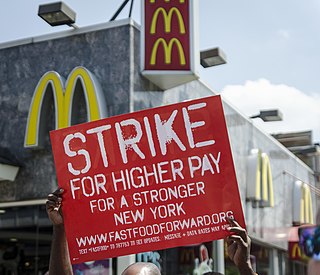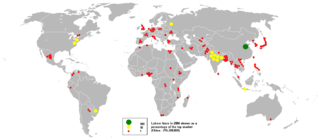Related Research Articles
A trade union, often simply called a union, is an organization of workers who have come together to achieve many common goals, such as protecting the integrity of their trade, improving safety standards, and attaining better wages, benefits, and working conditions through the increased bargaining power wielded by the creation of a monopoly of the workers. Trade unions typically fund the formal organization, head office, and legal team functions of the trade union through regular fees or union dues. The delegate staff of the trade union representation in the workforce are made up of workplace volunteers who are appointed by members in democratic elections.
Labour law mediates the relationship between workers, employing entities, trade unions and the government. Collective labour law relates to the tripartite relationship between employee, employer and union. Individual labour law concerns employees' rights at work also through the contract for work. Employment standards are social norms for the minimum socially acceptable conditions under which employees or contractors are allowed to work. Government agencies enforce labour law.

The labor history of the United States describes the history of organized labor, US labor law, and more general history of working people, in the United States. Beginning in the 1930s, unions became important components of the Democratic Party. Some historians question why a Labor Party did not emerge in the United States, in contrast to Western Europe.
A lockout is a work stoppage or denial of employment initiated by the management of a company during a labour dispute. In contrast to a strike, in which employees refuse to work, a lockout is initiated by employers or industry owners. Lockouts are usually implemented by simply refusing to admit employees onto company premises, and may include changing locks or hiring security guards for the premises. Other implementations include a fine for showing up, or a simple refusal of clocking in on the time clock. For these reasons, lockouts are referred to as the antithesis of strikes.

Trade Unions in India are registered and file annual returns under the Trade Union Act (1926). Statistics on Trade Unions are collected annually by the Labour Bureau of the Ministry of Labour, Government of India. As per the latest data, released for 2012, there were 16,154 trade unions which had a combined membership of 9.18 million. The Trade Union movement in India is largely divided along political lines and follows a pre-Independence pattern of overlapping interactions between political parties and unions. The net result of this type of system is debated as it has both advantages and disadvantages. Bharatiya Mazdoor Sangh is the Largest Trade union of India.

The All India Trade Union Congress (AITUC) is the oldest trade union federations in India. It is associated with the Communist Party of India. According to provisional statistics from the Ministry of Labour, AITUC had a membership of 14.2 million in 2013.It was founded on 31 October 1920 with Lala Lajpat Rai as its first president.
Opposition to trade unions comes from a variety of groups in society and there are many different types of argument on which this opposition is based.
The 2007 General Motors Strike was a labor union strike that lasted three days from September 23 to September 25 of 2007 organized by the United Auto Workers (UAW) union. The UAW were engaged in talks with General Motors (GM) to negotiate a new labor contract but were unable to come to an agreement before the deadline. Consequently, 73,000 workers walked out forcing 80 GM facilities in 30 states to cease operations. After the two day strike, the two parties reached an agreement in which the UAW union would assume the responsibility for managing retiree healthcare liabilities. The UAW previously went on strike against General Motors in 1970.
Labour in India refers to employment in the economy of India. In 2012, there were around 487 million workers in India, the second largest after China. Of these over 94 percent work in unincorporated, unorganised enterprises ranging from pushcart vendors to home-based diamond and gem polishing operations. The organised sector includes workers employed by the government, state-owned enterprises and private sector enterprises. In 2008, the organised sector employed 27.5 million workers, of which 17.3 million worked for government or government owned entities.
The African Mine Workers' Strike was a labour dispute involving mine workers of Witwatersrand in South Africa. It started on 12 August, 1946 and lasted approximately a week. The strike was attacked by police and over the week, at least 1,248 workers were wounded and at least 9 killed.
The Great Bombay Textile Strike was a textile strike called on 18 January 1982 by the mill workers of Mumbai under trade union leader Dutta Samant. The purpose of the strike was to obtain bonus and increase in wages. Nearly 250,000 workers of 65 textile mills went on strike in Mumbai.
Indian labour law refers to laws regulating labour in India. Traditionally, Indian governments at federal and state level have sought to ensure a high degree of protection for workers, but in practice, this differs due to form of government and because labour is a subject in the concurrent list of the Indian Constitution.

As the Economy of China has rapidly developed, issues of labor relations have also developed. Independent unions are illegal in China with only the All-China Federation of Trade Unions permitted to operate.
The 1928 South Indian railway strike was a general strike by the South Indian Railway Workers Union against plans of the South Indian Railway Company to lay off over 3,100 workers in order to reduce the expenditures of the company. The strike lasted from 29 June – 2 August 1928, and severely affected the transportation of people and goods across South India. The Madras government and the South Indian Railway Company responded with a crackdown. Most of the leaders of the strike were arrested and recognition to the union was withdrawn.The Government of Madras recorded it as the "most important event of the year".

The Misr Spinning and Weaving Company, also known as Misr Helwan or the El-Ghazl factory, is a large, publicly owned textile company located in El-Mahalla El-Kubra within the Nile Delta of Egypt, approximately 80 kilometers north of Cairo. The company's current board chairman is Mohamed Moheb Salah Elden. Egypt's largest industrial facility, Misr Helwan employs over 25,000 workers, many of whom have played an active role in Egyptian labor struggles. Large protests and strikes at Misr Helwan since 2006 contributed to the collapse of the Mubarak government, the 2011 Egyptian revolution, and the Arab Spring more generally.

The Fight for $15 is an American political movement advocating for the minimum wage to be raised to $15 per hour. The federal minimum wage was set at $7.25 per hour in 2009, and as of 2020 it has not been increased since. The movement has involved strikes by child care, home healthcare, airport, gas station, convenience store, and fast food workers for increased wages and the right to form a labor union. The "Fight for $15" movement started in 2012, in response to workers' inability to cover their costs on such a low salary, as well as the stressful work conditions of many of the service jobs which pay the minimum wage.

The National Federation of Women Workers (NFWW) was a trade union in the United Kingdom active in the first part of the 20th century. Instrumental in winning women workers the right to a minimum wage for the first time, the NFWW broke down barriers for women's membership in trade unions in general.

The Matamoros Strike in Matamoros, Tamaulipas is a strike of tens of thousands of Maquiladora workers that began in January, 2019 and is ongoing. The workers, whose manufacturing activity on the Mexico–United States border is tightly linked to the American manufacturing economy, have low wages relative to local living costs and have demanded 20% pay increases and bonuses. While dozens of companies have accepted workers' demands, others have not and the strikes have spread into other industries.

Nepal has a labour force of 16.8-million-workers, the 37th largest in the world as of 2017. Although agriculture makes up only about 28 per cent of Nepal's GDP, it employs more than two-thirds of the workforce. Millions of men work as unskilled labourers in foreign countries, leaving the household, agriculture, and raising of children to women alone. Most of the working-age women are employed in agricultural sector, contributions to which are usually ignored or undervalued in official statistics. Few women who are employed in the formal sectors face discrimination and significant wage gap. Almost half of all children are economically active, half of which are child labourers. Millions of people, men, women and children of both sexes, are employed as bonded labourers, in slavery-like conditions. Trade unions have played a significant role in earning better working conditions and workers' rights, both at the company level and the national government level. Worker-friendly labour laws, endorsed by the labour unions as well as business owners, provide a framework for better working conditions and secure future for the employees, but their implementation is severely lacking in practice. Among the highly educated, there is a significant brain-drain, posing a significant hurdle in fulfilling the demand for skilled workforce in the country.
The Bangladesh Garment Workers Trade Union Centre (GWTUC) is a trade union federation of garment workers in Bangladesh. It is one of the largest trade unions in that sector, with more than 20 factory trade unions affiliated to it. It has enough members to be formally recognised as a trade union, but does not have that status, as is not uncommon for left-oriented unions in Bangladesh. Politically, GWTUC is aligned with the Communist Party of Bangladesh.
References
- ↑ https://www.theguardian.com/world/2016/sep/02/indian-workers-strike-in-fight-for-higher-wages
- ↑ Banerji, Annie (September 3, 2016). "Tens of millions in India strike for higher wages". The China Post. Retrieved 2016-09-04.
- ↑ Madan, Karuna (September 2, 2016). "Strike call evokes mixed response in India". Gulf News India. Retrieved 2016-09-04.
- ↑ "Millions strike in India over reforms". BBC News. September 2, 2016. Retrieved 2016-09-04.
- ↑ Khan, Shehab (September 3, 2016). "Humanity's biggest ever strike is underway". The Independent. Retrieved 2016-09-04.
- ↑ "Millions of Indian workers strike for better wages". Aljazeera. September 3, 2016. Retrieved 2016-09-04.
- ↑ "General strike: trade unions claim success, normal life unaffected". The Hindu . September 3, 2016. ISSN 0971-751X . Retrieved 2016-09-04.